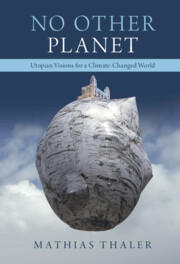Chapter 3 - What If
Planet Earth as an Actor
Published online by Cambridge University Press: 07 October 2022
Summary
Chapter 3 moves on to our first constellation, the utopian vision of Planet Earth as an actor in its own right. Rather than conceiving of humans as endowed with a special status that sets them apart from both non-human animals and the planetary ecosphere, proponents of this idea sketch a hypothetical scenario that destabilizes entrenched ways of reflecting on our species’ place in the world. I approach this proposal, framed by a What-If plot line, via two stages: first, by unpacking the Gaia hypothesis as recently revisited by Bruno Latour. I posit that Gaia should be deciphered as a framework that seeks to estrange us for, rather than from, the world. In a second step, the chapter directs attention to N. K. Jemisin’s Broken Earth trilogy, proposing that this fantasy text can further tease out the elusive Gaia figure. Even if the champions of the Gaia hypothesis as well as the author of the Broken Earth trilogy assess several options, their utopianism primarily consists in the speculative opening up of novel possibilities for being and living otherwise. A fault line running through the What-If plot line is therefore its characteristic reluctance to forge concrete ways forward.
Information
- Type
- Chapter
- Information
- No Other PlanetUtopian Visions for a Climate-Changed World, pp. 97 - 145Publisher: Cambridge University PressPrint publication year: 2022
